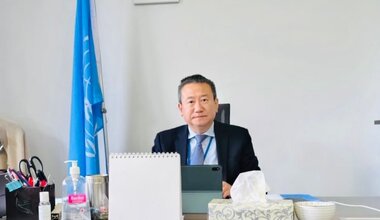High-Level Workshop on Natural Resource Governance in Gaborone, Botswana
Gaborone, Botswana, 8 October 2025 - At the initiative of Mr. Huang Xia, Special Envoy of the United Nations Secretary-General for the Great Lakes region, a high-level workshop on “Enhancing the ICGLR Regional Certification Mechanism through Lessons Learned from the Kimberley Process” took place in Gaborone, Botswana, on 7-8 October 2025.
The event was jointly organized by the Office of the Special Envoy, the International Conference on the Great Lakes Region (ICGLR) Secretariat, the Kimberley Process Secretariat and the German International Development Agency (GIZ), with the support of the Government of Botswana.
The workshop brought together some 60 high-level participants, including H.E. Mr. Mokgweetsi Eric Masisi, former President of Botswana and African Union (AU)– Southern African Development Community (SADC)–East African Community (EAC) Facilitator for the Democratic Republic of the Congo (DRC)–Rwanda peace process; Mr. Huang Xia, UN Special Envoy for the Great Lakes region; Amb. João Samuel Caholo, Executive Secretary of the ICGLR; Mr. Bojun Tang, Executive Secretary of the Kimberley Process Secretariat; Mr. Sghair M’bareck Said, AU High Representative for the Great Lakes region; and Mr. Johan Borgstam, EU Special Representative for the Great Lakes region. Senior officials from ICGLR Member States, the African Union, SADC, the European Union, the Organisation for Economic Co-operation and Development (OECD), the World Bank, as well as representatives of civil society, the private sector, and technical experts also took part.
The workshop comes at a critical time, as ICGLR Member States are reviewing the Regional Initiative against the Illegal Exploitation of Natural Resources (RINR). Building on more than two decades of lessons learned from the Kimberley Process, the discussions aimed to strengthen the ICGLR Regional Certification Mechanism by improving compliance and traceability, fostering inclusive governance, and aligning regional frameworks with international standards. The outcome is expected to contribute to peace, stability and sustainable development across the Great Lakes region.
 UN
UN





